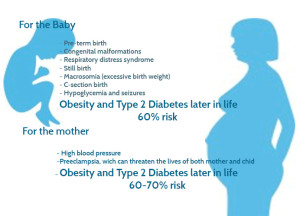Diet and physical activity and Gestational Diabetes
 As mentioned in another article on this blog, Gestational Diabetes Mellitus (GDM) is broadly defined as a situation in which a woman first faces a diagnosis of diabetes mellitus or glucose intolerance in the course of pregnancy, and which is usually resolved, or ended, at the end of that pregnancy.
As mentioned in another article on this blog, Gestational Diabetes Mellitus (GDM) is broadly defined as a situation in which a woman first faces a diagnosis of diabetes mellitus or glucose intolerance in the course of pregnancy, and which is usually resolved, or ended, at the end of that pregnancy.
Although the criteria for its diagnosis offer some variation, it is a particularly prevalent pathology that affects between 15-20% of pregnancies, reaching 30% in some regions of the world when the diagnostic criteria of the World Health Organization (WHO) are used. The WHO has offered some explanations to justify this upturn: the delay in the age at which women face motherhood, the increase in obesity among the female population, not forgetting the increasingly frequent migratory movements of women at high risk of suffering this pathology to geographical regions with a lower general risk, but which otherwise would not be recorded.
Serious complications. Present and future COMPLICATIONS DIABETES GESTATIONAL
Beyond the undesirable news at the time of receiving a diagnosis of GDM, the matter implies as we already saw different risks throughout the life cycle as much of the mother as of the descendants; briefly:
- Women who have been diagnosed with GDM have up to a 70% chance of being diagnosed with type 2 diabetes mellitus within 28 years after childbirth.
- Children born after pregnancy with GDM have an increased risk of macrosomia, postpartum hypoglycemia and epigenetic changes that will condition, upwardly, their risk of obesity and type 2 diabetes throughout their life cycle.
Diet and physical activity
Given this panorama, it is not surprising that various investigations are being carried out with the aim of both minimizing the risk of GDM and treating its evolution once it has been diagnosed. One of the most recent intervention studies, published in the journal of the American Diabetes Association contrasted, in a population of 293 women, that those who were involved in lifestyle practice of physical activity and diet, there were 40% fewer cases of GDM.
In this regard, a review with meta-analysis of observational studies was published in 2018: “Associations of Diet and Physical Activity with Risk for Gestational Diabetes Mellitus: A Systematic Review and Meta-Analysis“, and the results could not have been more eloquent despite the observational nature of the work:
Mediterranean pattern diets or those known as “DASH” (Diet for Hypertension Reduction) and higher levels of physical activity before or at the beginning of pregnancy were associated with a lower risk or probability of GDM, respectively.
In this regard, a review with meta-analysis of observational studies was published in 2018: “Associations of Diet and Physical Activity with Risk for Gestational Diabetes Mellitus: A Systematic Review and Meta-Analysis“, and the results could not have been more eloquent despite the observational nature of the work:
Mediterranean pattern diets or those known as “DASH” (Diet for Hypertension Reduction) and higher levels of physical activity before or at the beginning of pregnancy were associated with a lower risk or probability of GDM, respectively.
As it could not be otherwise, the recommendations that are usually addressed to the general population for the prevention of type 2 diabetes are also valid for the prevention of GDM.
Regarding specific data this work found the following associations:
- Consumption of sugary beverages was statistically significantly associated with an increased risk of GDM.
- The authors highlighted the difficulty of defining what is known as the “Mediterranean diet”. However, they concluded that the most positive data were associated with consumption patterns in which a large relative quantity of fruits, vegetables, legumes, natural nuts, whole grains, extra virgin olive oil, fish, as opposed to the low presence of meat and “appetizers” are contrasted.
- In the field of physical activity, the study found a preventive association of the practice of exercise against the GDM both at the beginning of pregnancy, and even more so when it is customary to practice it “before”. In terms of time and according to the most common guidelines for pregnancy, it is recommended to practice 150 minutes/week of some type of activity of moderate intensity or 75 minutes/week when it is vigorous.
- Although it is obvious, it should be noted that the authors make a special appeal not so much to the care of women during pregnancy in relation to their diet and activity – which also – but to the importance of these healthy lifestyles being present before the pregnancy. In her own words: “our review suggests that a Mediterranean-style diet and adequate physical activity are promising interventions for the prevention of GDM. However, a greater degree of protection is obtained when both lifestyle factors are incorporated before pregnancy and prolonged during pregnancy.
There should be no doubt about considering that when we talk about health, there are two key aspects: adequate physical activity and adequate nutrition.
And since we’re at it, a question first and then a suggestion:

Do you think you are able of doing everything you do in one day in 23 and a half hours?
If the answer is yes, you already have half an hour to exercise (appropriate to your circumstances) every day. Every day
Latest posts by Juan Revenga Frauca (see all)
- Obesity recognized as a chronic disease - 13 October, 2021
- Who said you have to eat everything? - 7 October, 2021
- Diabetes and Alzheimer - 29 January, 2021









